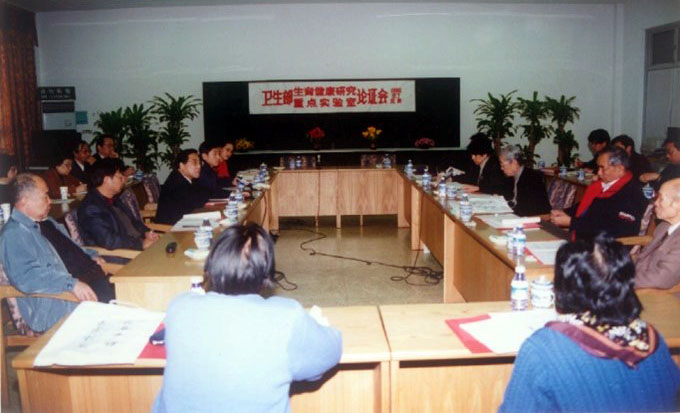
Brief introduction
Peking University Institute of Reproductive and Child Health, the predecessor of which was the Division of Healthcare Epidemiology at the Peking University School of Public Health, was formally established in 2000 and affiliated with the Peking University Health Science Center. The institute returned to the Peking University School of Public Health in 2012, and now it is one of the thirteen entity departments of the Peking University School of Public Health. The institute's mission is to focus on national needs, conducting epidemiological population and experimental research, big data research, and applied basic research on genetics and environment in the field of reproductive health, with the aim to elucidate the epidemiological characteristics of major reproductive health issues, serving national reproductive health policies and promoting the health of women and children. The main research areas include reproductive health epidemiology, environment and reproductive health, and translational application research in reproductive health, especially focusing on the distribution patterns, influencing factors, pathogenesis, and prevention strategies of adverse reproductive health outcomes, utilization of big data in reproductive health, application of artificial intelligence, and other important issues related to interdisciplinary transformation. Its achievements have been published in top international journals with the faculties as the first or corresponding authors, such as NEJM, Lancet, JAMA, BMJ, Cell, PNAS, Science Bulletin, JAMA subsidiaries, Lancet subsidiaries, Science subsidiaries, Nature subsidiaries, The Innovation, Environ Health Perspect, Int J Epidemiol, Environ Sci Technol, etc. It also hosts the core Chinese scientific journal "Chinese Journal of Reproductive Health" (Website: http://cjrh.bjmu.edu.cn/).In the past five years, it has been approved more than 30 national projects, more than 20 provincial and ministerial projects, National Natural Science Foundation of China Excellent Fund project (1 researcher), Beijing Natural Science Foundation Outstanding Fund project (1 researcher).
The institute is part of the national key discipline of Epidemiology and Health Statistics and is specifically responsible for the National Health Commission Key Laboratory of Reproductive Health (Peking University), as well as the Office for National Maternal & Child Health Statistics of China. Some researchers are key members of the State Key Laboratory of Female Fertility Promotion (Peking University Third Hospital) and the Ministry of Education's Key Laboratory for Epidemiology of Major Diseases (Peking University). The institute currently has 18 faculty members with backgrounds in epidemiology, biostatistics, environmental science, maternal and child healthcare, food hygiene and nutrition, and other related disciplines. It has 30 doctoral students and 32 master's students majored in Epidemiology and Health Statistics. It also has a postdoctoral mobility station, recruiting postdoctoral researchers year-round.

Figure 1. Founding demonstration meetingof NHC Key Laboratory of Reproductive Health (Peking University)
The institute is nationally and internationally renowned in the field of maternal, child, and reproductive health research. In the 1990s, the institute in collaboration with the U.S. Centers for Disease Control and Prevention conducted a large-scale population intervention study on the prevention of neural tube defects with folic acid, confirming that daily supplementation of 0.4 mg folic acid during the periconceptional period significantly reduces the risk of neural tube defects. The main findings of this study were published in the New England Journal of Medicine and the Lancet, providing strong support for China's major public health project on supplementing folic acid to prevent neural tube defects. In 2006, the institute conducted the largest individually randomized controlled study on the prevention of adverse pregnancy outcomes with multivitamin supplementation during pregnancy, proving that prenatal iron-folic acid and 13 other micronutrient supplements to Chinese women with no or mild anemia prevented later pregnancy anemia beyond any benefit conferred by folic acid alone but did not affect perinatal mortality or other infant outcomes. The main findings were published in JAMA Internal Medicine, providing high-level evidence for standardizing related clinical healthcare practices in China and contributing important evidence to the World Health Organization's guidelines on multivitamin supplementation.

Figure 2. Signing ceremony for “China-US Cooperation Project on the Prevention of Neural Tube Defects”
In the area of major congenital defects, Professor Ren Aiguo and colleagues conducted long-term systematic research, obtaining detailed epidemiological evidence, and first reported a significant association between exposure to polycyclic aromatic hydrocarbons and neural tube defects and elucidated the underlying mechanism. The main findings were published in PNAS, American Journal of Epidemiology, Environmental Science & Technology, and Chinese Journal of Epidemiology, making substantial contributions to China's birth defect prevention efforts, and earning a first-class Natural Science Award from the Ministry of Education. In the field of big data utilization in reproductive health, Professor Liu Jianmeng and his colleagues conducted a series of studies around major reproductive health issues such as cesarean delivery, institutional childbirth, pre-marital medical examinations, the selective two-child policy, and the universal two-child policy, providing valuable evidence for government decision-making especially that on reproductive health and resulting in multiple publications in leading journals such as JAMA, BMJ, Science Bulletin, and Chinese Medical Journal. In the field of environmental and reproductive health research, the institute has published a series of high-level research in Cell, Lancet family of journals, Science family of journals, Nature family of journals, The Innovation, Environmental Health Perspectives, Environmental Science & Technology, and other specialized journals, mapping the spatiotemporal developmental atlas of multiple regions of the human brain and exploring the application of artificial intelligence in environmental and reproductive health research.
The current director of the institute, Professor Li Hongtian, also holds the positions of the director of two university-enterprise joint laboratories and the director of the Office for National Maternal & Child Health Statistics of China. The university-enterprise joint laboratories focus on transformative application of interdisciplinary studies, integrating industry, academia, and research to serve clinical healthcare practices. The Office for National Maternal & Child Health Statistics of China is responsible for collecting, analyzing, and managing national routine statistical data on women and children, serving the Maternal and Child Health Department of the National Health Commission and providing scientific support for the formulation of national maternal and child health policies.
The National Health Commission Key Laboratory of Reproductive Health serves as an important platform for interdisciplinary research. The current director of the laboratory is Professor Liu Jianmeng, and the director of the academic committee is Academician Qiao Jie. The key laboratory houses three main experimental platforms, including “Reproductive Health Adverse Outcomes Modeling Platform”, “Nutrition Analysis and Evaluation Platform”, and “Exposome Integrated Analysis Platform”. It is equipped with large and medium-sized devices such as liquid chromatography-mass spectrometry systems, gas chromatography-mass spectrometry systems, atomic absorption spectrometers, ultra-high-performance liquid chromatography, high-performance liquid chromatography, and chemiluminescence immunoassay analyzers. The laboratory has a leading advantage in the analysis and evaluation of nutrients such as folate and the analysis of environmental exposure groups.
The institute publishes the "Chinese Journal of Reproductive Health" (a core scientific journal in China), which includes topics on women's health, children's health, family planning, obstetrics and gynecology, pediatrics, andrology, and reproductive medicine. It serves as an important academic platform for exchanging new theories, advancements, results, and methods in the field of reproductive health in China.

